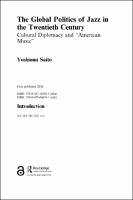Chapter Introduction
Proposal review
Abstract
From the mid-1950s to the late 1970s, jazz was harnessed as America’s "sonic weapon" to promote an image to the world of a free and democratic America. Dizzy Gillespie, Dave Brubeck, Duke Ellington and other well-known jazz musicians were sent around the world – including to an array of Communist countries – as "jazz ambassadors" in order to mitigate the negative image associated with domestic racial problems. While many non-Americans embraced the Americanism behind this jazz diplomacy without question, others criticized American domestic and foreign policies while still appreciating jazz – thus jazz, despite its popularity, also became a medium for expressing anti-Americanism. This book examines the development of jazz outside America, including across diverse historical periods and geographies – shedding light on the effectiveness of jazz as an instrument of state power within a global political context.
Keywords
Arts; Music; Western Music Styles (Early & Classical); 20th Century Music; Popular Music; Jazz; Humanities; History; Contemporary History 1945-; The Cold War; Media & Film Studies; Popular Music; History of Popular Music; Politics & International Relations; International Relations; Foreign Policy; International Relations Theory; International Political Economy; International PoliticsISBN
9780429060595Publisher
Taylor & FrancisPublisher website
https://taylorandfrancis.com/Publication date and place
2020Imprint
RoutledgeClassification
Regional / International studies


 Download
Download